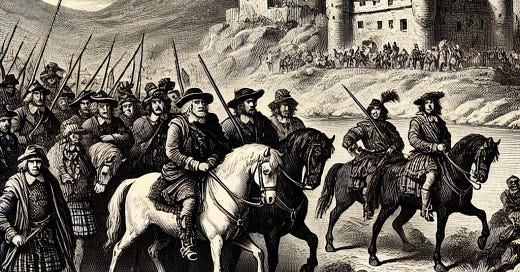The Scottish Privy Council’s Unjust Acts (1679-1688)
The Scottish Privy Council, an influential governing body in Scotland, was central to the administration of the kingdom from the late Middle Ages until its dissolution in 1708. Tasked with advising the monarch and implementing royal policies, the Council's actions during the reigns of Charles II and James II reveal a troubling history of power abused for oppressive ends. This post explores the unjust acts committed by the Scottish Privy Council during the late 17th century, specifically between 1679 and 1688, and their lasting impact on Scotland.
The Role of the Scottish Privy Council
The Privy Council was established to assist the monarch in governing Scotland. It comprised high-ranking nobles, clergy, and officials who wielded significant power over the administration of justice, finance, and public order. While the Council's role was to ensure the smooth running of the kingdom, its activities during certain periods reflected a darker, more authoritarian side of governance.
Persecution of Covenanters
One of the most egregious examples of the Scottish Privy Council's abuse of power was its persecution of the Covenanters. The Covenanters were a group of Scottish Presbyterians who resisted attempts by Charles II and James II to impose Anglican worship on Scotland. They were staunch defenders of their religious freedoms and the Presbyterian Church.
The Privy Council, enforcing the monarchs' policies, ruthlessly suppressed the Covenanters. This period, known as "The Killing Time" (1679-1688), saw widespread persecution, including the execution of Covenanters without trial, brutal torture, and the use of dragoons (mounted soldiers) to hunt down dissenters. These actions were not only unjust but also marked by extreme cruelty, as Covenanters faced public hangings, drownings, and other forms of execution designed to instill fear.
Arbitrary Justice and Imprisonment
The Council frequently resorted to arbitrary justice, bypassing the legal norms and due process. Individuals suspected of dissent or opposition to the royal policies were often imprisoned without formal charges or trials. The notorious Bass Rock, an island fortress in the Firth of Forth, became a prison for many Covenanters and political prisoners who suffered under harsh and inhumane conditions.
This arbitrary use of power extended beyond religious persecution. The Privy Council also targeted political opponents and those suspected of sedition, using imprisonment as a tool to silence dissent and maintain control over the population.
The Use of Torture
Torture was another dark aspect of the Privy Council's methods. Instruments like the thumbscrew and the boot were used to extract confessions or force individuals to recant their beliefs. The use of torture not only violated basic human rights but also undermined the legitimacy of the Council and the monarchy it served.
Economic Oppression
The Scottish Privy Council also engaged in economic oppression. It imposed heavy fines and confiscated property from those who opposed royal decrees or supported the Covenanters. This economic punishment extended to entire communities, with villages and towns suffering collective fines and punitive measures that devastated local economies and livelihoods.
Social and Cultural Suppression
Beyond economic and physical persecution, the Privy Council's policies also sought to suppress the social and cultural life of the Covenanters and their supporters. Public gatherings for worship were banned, and ministers who preached without the Council's approval were hunted down and punished. This suppression of religious and cultural expression further alienated large segments of the Scottish population.
The Impact on Communities
The unjust acts of the Scottish Privy Council had a profound impact on Scottish communities. Families were torn apart, with many members imprisoned, exiled, or executed. The pervasive fear of persecution stifled community life, as people were wary of associating with known dissenters. This climate of fear and repression had long-lasting effects, contributing to a legacy of mistrust towards centralized authority.
Legal and Political Repercussions
The Council's actions during this period set dangerous precedents for the abuse of legal and political power. The bypassing of due process and the use of torture and arbitrary imprisonment eroded trust in the legal system. These actions highlighted the need for stronger legal protections and checks on governmental power, lessons that would resonate in the political developments of later centuries.
Legacy and Reflection
The unjust acts of the Scottish Privy Council left a lasting scar on Scottish society. The persecution of the Covenanters and the arbitrary use of power created a legacy of mistrust and resentment towards centralized authority. These events played a significant role in shaping Scottish identity and the country's struggle for religious and political freedoms.
The actions of the Privy Council during this period serve as a stark reminder of the dangers of unchecked power. They highlight the importance of legal and institutional safeguards to protect individual rights and ensure justice. The eventual dissolution of the Privy Council in 1708 marked the end of an era, but the lessons from its history remain relevant.
Modern Reflections on Historical Injustices
Reflecting on the unjust acts of the Scottish Privy Council offers valuable insights for contemporary society. It underscores the importance of vigilance in safeguarding human rights and the rule of law. Historical injustices remind us of the need for accountability and transparency in government to prevent the recurrence of such abuses.
Conclusion
The history of the Scottish Privy Council's unjust acts from 1679 to 1688 is a testament to the perils of authoritarian governance and the abuse of power. From the persecution of the Covenanters to arbitrary imprisonment, economic oppression, and cultural suppression, the Council's actions had profound and lasting effects on Scotland. Reflecting on this period offers valuable lessons on the importance of justice, accountability, and the protection of human rights in any society. Understanding this dark chapter in history helps us appreciate the ongoing struggle for a fair and just society where the rule of law prevails over the abuse of power.





